 W
WAdmiral of the Fleet George Anson, 1st Baron Anson, was a Royal Navy officer. Anson served as a junior officer during the War of the Spanish Succession and then saw active service against Spain at the Battle of Cape Passaro during the War of the Quadruple Alliance. He then undertook a circumnavigation of the globe during the War of Jenkins' Ear. Anson commanded the fleet that defeated the French Admiral de la Jonquière at the First Battle of Cape Finisterre during the War of the Austrian Succession.
 W
WAdmiral of the White Sir John Balchen, sometimes written as Balchin, was an officer of the British Royal Navy with a long and distinguished career during the late 17th and early 18th centuries. In the course of his service at sea, Balchen saw action in numerous battles against the French and Spanish navies across 60 years and three separate wars. He was twice captured by the French in action, both times being exonerated and commended for the defence of his ships against overwhelming odds.
 W
WCurtis Barnett, was an officer of the Royal Navy. He served during the War of the Austrian Succession, commanding ships in the Mediterranean and in the English Channel, before being appointed a commodore in 1744 he was appointed Commander-in-Chief, East Indies. He served with moderate success, but died after a short illness on board a British ship at Fort St. David, Cuddalore in 1746.
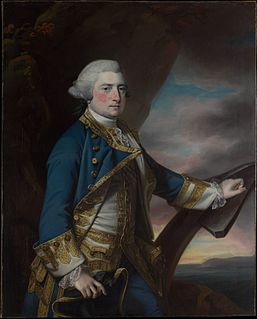 W
WAdmiral Harry Powlett, 6th Duke of Bolton PC was a British nobleman and naval officer.
 W
WAdmiral of the Blue Edward Boscawen, PC was a British Admiral in the Royal Navy and Member of Parliament for the borough of Truro, Cornwall. He is known principally for his various naval commands during the 18th century and the engagements that he won, including the siege of Louisburg in 1758 and Battle of Lagos in 1759. He is also remembered as the officer who signed the warrant authorising the execution of Admiral John Byng in 1757, for failing to engage the enemy at the Battle of Minorca (1756). In his political role, he served as a Member of Parliament for Truro from 1742 until his death although due to almost constant naval employment he seems not to have been particularly active. He also served as one of the Lords Commissioners of the Admiralty on the Board of Admiralty from 1751 and as a member of the Privy Council from 1758 until his death in 1761.
 W
WCharles Brown was an officer of the Royal Navy. He saw service during the Nine Years' War, and the Wars of the Spanish Succession, Quadruple Alliance and Austrian Succession.
 W
WCaptain Frederick Cornewall was an officer in the British Royal Navy.
 W
WCaptain James Cornewall was an officer in the British Royal Navy who became a national hero following his death at the Battle of Toulon in 1744. His monument in Westminster Abbey was the first ever to be erected by Parliament at public expense.
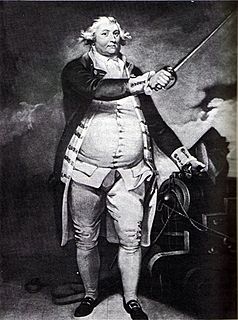 W
WRear Admiral Sir Charles Douglas, 1st Baronet of Carr was a descendant of the Earls of Morton and a distinguished British naval officer. He is particularly known for his part in the Battle of the Saintes during the American War of Independence where he helped pioneer the tactic of "breaking the line".
 W
WRobert Duff was an officer of the Royal Navy during the War of the Austrian Succession, the Seven Years' War and the American War of Independence. He rose to the rank of Admiral, and served briefly as colonial governor of Newfoundland.
 W
WLord Augustus FitzRoy was a British officer of the Royal Navy. He served during the War of the Austrian Succession, and was involved in the capture of the Spanish ship of the line, Princesa, a major prize in the war. He was also the father of Augustus FitzRoy, 3rd Duke of Grafton, who became Prime Minister of Great Britain.
 W
WArthur Forrest was an officer of the Royal Navy who saw service during the War of the Austrian Succession and the Seven Years' War, rising to the rank of captain and the post of commodore. He also owned 3,000 acres of sugar plantations, and a considerable number of slaves, in the Colony of Jamaica.
 W
WSir Francis Geary, 1st Baronet was an officer of the Royal Navy. He served during the War of the Austrian Succession, the Seven Years' War, and the American War of Independence, eventually rising to the rank of Admiral.
 W
WNicholas Haddock was an admiral in the Royal Navy and Commander-in-Chief of Britain's naval forces in the Mediterranean between 1738 and 1742. Despite an active and successful early and middle career, his reputation was tarnished in 1740 when he failed to prevent the Spanish and French fleets from combining to support an invasion of Italy. Amid public outcry he was forced to resign his naval responsibilities and return to England, where he fell into a melancholic state.
 W
WAdmiral Sir Robert Harland, 1st Baronet was a Royal Navy officer. He commanded HMS Tilbury at the Second Battle of Cape Finisterre in October 1747 during the War of the Austrian Succession and commanded HMS Princess Louisa at the Battle of Lagos in August 1759 during the Seven Years' War. He went on to be Commander-in-Chief of the East Indies Station and then First Naval Lord.
 W
WEdward Hawke, 1st Baron Hawke, KB, PC, of Scarthingwell Hall in the parish of Towton, near Tadcaster, Yorkshire, was a Royal Navy officer. As captain of the third-rate HMS Berwick, he took part in the Battle of Toulon in February 1744 during the War of the Austrian Succession. He also captured six ships of a French squadron in the Bay of Biscay in the Second Battle of Cape Finisterre in October 1747.
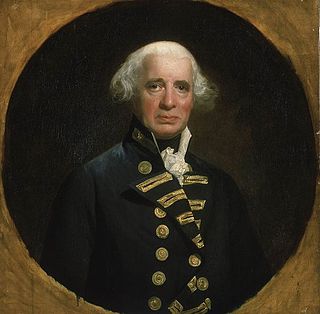 W
WAdmiral of the Fleet Richard Howe, 1st Earl Howe, was a British naval officer. After serving throughout the War of the Austrian Succession, he gained a reputation for his role in amphibious operations against the French coast as part of Britain's policy of naval descents during the Seven Years' War. He also took part, as a naval captain, in the decisive British naval victory at the Battle of Quiberon Bay in November 1759.
 W
WCharles Inglis was an officer of the Royal Navy who saw service during the War of the Austrian Succession, the Seven Years' War, and the American War of Independence, rising to the rank of rear-admiral.
 W
WGeorge Johnstone was an officer of the Royal Navy who saw service during the War of the Austrian Succession, the Seven Years' War and the American War of Independence, rising to the rank of post-captain and serving for a time as commodore of a squadron. In a multifaceted career he was also a member of Parliament, a director of the East India Company, a member of the Carlisle Peace Commission and the first Governor of West Florida from 1763 until 1767.
 W
WAdmiral Augustus Keppel, 1st Viscount Keppel, PC was a Royal Navy officer and politician who sat in the House of Commons from 1755 to 1782. He saw action in command of various ships, including the fourth-rate Maidstone, during the War of the Austrian Succession. He went on to serve as Commodore on the North American Station and then Commander-in-Chief, Jamaica Station during the Seven Years' War. After that he served as Senior Naval Lord and then Commander-in-Chief of the Channel Fleet.
 W
WSir Charles Knowles, 1st Baronet was a British naval officer who served in the Royal Navy, seeing service during the War of Jenkins' Ear, the wider War of the Austrian Succession, and the Seven Years' War. He also briefly served under the Imperial Russian Navy during the Russo-Turkish War. He rose to the rank of Admiral in a long and varied career, crowned with both success, and at times, controversy.
 W
WRichard Lestock was an officer in the Royal Navy, eventually rising to the rank of Admiral. He fought in a number of battles, and was a controversial figure, most remembered for his part in the defeat at the Battle of Toulon, and the subsequent court-martial.
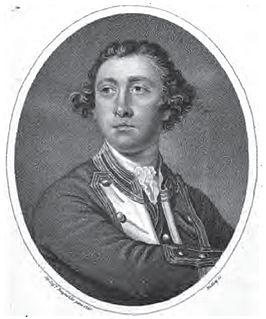 W
WSir John Lockhart-Ross, 6th Baronet, known as John Lockhart from 1721 to 1760, was an officer of the Royal Navy who saw service during the War of the Austrian Succession, Seven Years' War, and the American War of Independence, and served for a time as a Member of Parliament.
 W
WThomas Mathews was a British officer of the Royal Navy, who rose to the rank of admiral.
 W
WHenry Medley was an officer of the Royal Navy, rising to the rank of vice-admiral.
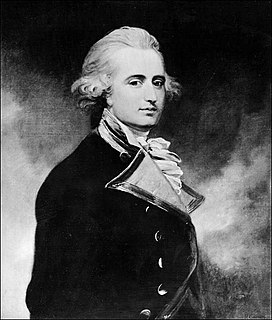 W
WAdmiral John Montagu (1719–1795) was an English naval officer and colonial governor of Newfoundland.
 W
WSir John Moore, 1st Baronet, KB was a British officer of the Royal Navy during the War of the Austrian Succession and the Seven Years' War. He eventually rose to the rank of admiral.
 W
WSavage Mostyn was an officer of the Royal Navy who saw service during the War of the Austrian Succession and the Seven Years' War. He embarked on a political career, and was a Member of Parliament, Comptroller of the Navy, and one of the Lords of the Admiralty.
 W
WAdmiral George Edgcumbe, 1st Earl of Mount Edgcumbe, PC was a British peer, naval officer and politician.
 W
WPhilemon Pownoll of Sharpham in the parish of Ashprington in Devon, England, was an officer of the Royal Navy who saw service during the War of the Austrian Succession, the Seven Years' War and the American War of Independence, rising to the rank of post-captain.
 W
WRobert Roddam was an officer of the Royal Navy who saw service during the War of the Austrian Succession, the Seven Years' War, and the American War of Independence. He survived to see the French Revolutionary and Napoleonic Wars, but was not actively employed during them.
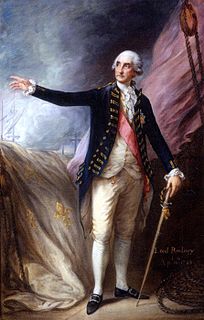 W
WAdmiral George Brydges Rodney, 1st Baron Rodney, KB, was a British naval officer. He is best known for his commands in the American War of Independence, particularly his victory over the French at the Battle of the Saintes in 1782. It is often claimed that he was the commander to have pioneered the tactic of breaking the line.
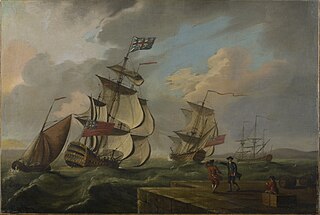 W
WJohn Rous was a privateer and then an officer of the Royal Navy. He served during King George's War and the French and Indian War. Rous was also the senior naval officer on the Nova Scotia station during Father Le Loutre's War (1749–1755). Rous' daughter Mary married Richard Bulkeley (governor) and is buried in the Old Burying Ground.
 W
WAdmiral of the Fleet Sir William Rowley KB was a Royal Navy officer. He distinguished himself by his determination as commander of the vanguard at the Battle of Toulon in February 1744 during the War of the Austrian Succession. He went on to be Commander-in-Chief of the Mediterranean Fleet in August 1744 and successfully kept the Spanish and French fleets out of the Mediterranean area but was relieved of his command following criticism of his decision as presiding officer at a court-martial.
 W
WVice-Admiral Sir Joshua Rowley, 1st Baronet (1734–1790) was the fourth son of Admiral Sir William Rowley. Sir Joshua was from an ancient English family, originating in Staffordshire (England) and was born on 1 May 1734. Rowley served with distinction in a number of battles throughout his career and was highly praised by his contemporaries. Unfortunately whilst his career was often active he did not have the opportunity to command any significant engagements and always followed rather than led. His achievements have therefore been eclipsed by his contemporaries such as Keppel, Hawke, Howe and Rodney. Rowley however remains one of the stalwart commanders of the wooden walls that kept Britain safe for so long.
 W
WCaptain Philip de Saumarez (1710–1747) was a British naval officer, notable for his role as captain of HMS Nottingham in capturing the French ship Mars and as the first lieutenant of George Anson,1st Baron Anson in his voyage around the world. He designed what would eventually be the first uniforms for the Royal Navy.
 W
WSir Charles Saxton, 1st Baronet was an officer of the Royal Navy who saw service during the War of the Austrian Succession, the Seven Years' War, the American War of Independence and the French Revolutionary and Napoleonic Wars, rising to the rank of captain.
 W
WThe Honourable Charles Stewart was an officer of the Royal Navy who saw service during the Nine Years' War, and the Wars of the Spanish Succession, Quadruple Alliance and Austrian Succession. He embarked on a political career, and was a Member of Parliament for the Parliaments of Ireland and Great Britain.
 W
WAdmiral Sir Peter Warren, KB was an Irish naval officer in the Royal Navy who commanded British forces in the 1745 attack on the French fortress of Louisbourg, Nova Scotia. He later sat as MP for Westminster.
 W
WVice Admiral Charles Watson was an officer of the Royal Navy, who served briefly as colonial governor of Newfoundland, and died at Calcutta, India.